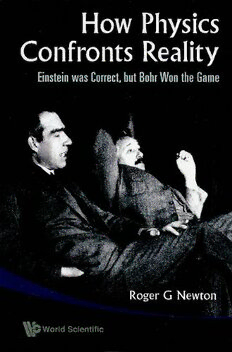Download How Physics Confronts Reality: Einstein Was Correct, but Bohr Won the Game PDF Free - Full Version
Download How Physics Confronts Reality: Einstein Was Correct, but Bohr Won the Game by Roger G. Newton in PDF format completely FREE. No registration required, no payment needed. Get instant access to this valuable resource on PDFdrive.to!
About How Physics Confronts Reality: Einstein Was Correct, but Bohr Won the Game
This book recalls, for nonscientific readers, the history of quantum mechanics, the main points of its interpretation, and Einstein's objections to it, together with the responses engendered by his arguments. Most popular discussions on the strange aspects of quantum mechanics ignore the fundamental fact that Einstein was correct in his insistence that the theory does not directly describe reality. While that fact does not remove the theory's counterintuitive features, it casts them in a different light. Context is provided by following the history of two central aspects of physics such as: the elucidation of the basic structure of the world made up of particles, and the explanation, as well as the prediction, of how objects move. This history, prior to quantum mechanics, reveals that whereas theories and discoveries concerning the structure of nature became increasingly realistic, the laws of motion, even as they became more powerful, became more and more abstract and remote from intuitive notions of reality. Newton's laws of motion gained their abstract power by sacrificing direct and intuitive contact with real experience. Arriving 250 years after Newton, the break with a direct description of reality embodied in quantum mechanics was nevertheless profound. Some Quantum History Rules and Interpretations Einstein's Defection From Atomism to Real Particles Laws of Motion Fields New Particles and Their Quantum Origins Atoms, Inside and Out Methods and Underpinnings
Detailed Information
| Author: | Roger G. Newton |
|---|---|
| Publication Year: | 2009 |
| ISBN: | 9789814277037 |
| Pages: | 157 |
| Language: | English |
| File Size: | 8.791 |
| Format: | |
| Price: | FREE |
Safe & Secure Download - No registration required
Why Choose PDFdrive for Your Free How Physics Confronts Reality: Einstein Was Correct, but Bohr Won the Game Download?
- 100% Free: No hidden fees or subscriptions required for one book every day.
- No Registration: Immediate access is available without creating accounts for one book every day.
- Safe and Secure: Clean downloads without malware or viruses
- Multiple Formats: PDF, MOBI, Mpub,... optimized for all devices
- Educational Resource: Supporting knowledge sharing and learning
Frequently Asked Questions
Is it really free to download How Physics Confronts Reality: Einstein Was Correct, but Bohr Won the Game PDF?
Yes, on https://PDFdrive.to you can download How Physics Confronts Reality: Einstein Was Correct, but Bohr Won the Game by Roger G. Newton completely free. We don't require any payment, subscription, or registration to access this PDF file. For 3 books every day.
How can I read How Physics Confronts Reality: Einstein Was Correct, but Bohr Won the Game on my mobile device?
After downloading How Physics Confronts Reality: Einstein Was Correct, but Bohr Won the Game PDF, you can open it with any PDF reader app on your phone or tablet. We recommend using Adobe Acrobat Reader, Apple Books, or Google Play Books for the best reading experience.
Is this the full version of How Physics Confronts Reality: Einstein Was Correct, but Bohr Won the Game?
Yes, this is the complete PDF version of How Physics Confronts Reality: Einstein Was Correct, but Bohr Won the Game by Roger G. Newton. You will be able to read the entire content as in the printed version without missing any pages.
Is it legal to download How Physics Confronts Reality: Einstein Was Correct, but Bohr Won the Game PDF for free?
https://PDFdrive.to provides links to free educational resources available online. We do not store any files on our servers. Please be aware of copyright laws in your country before downloading.
The materials shared are intended for research, educational, and personal use in accordance with fair use principles.

